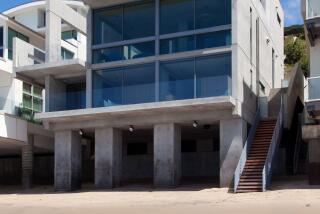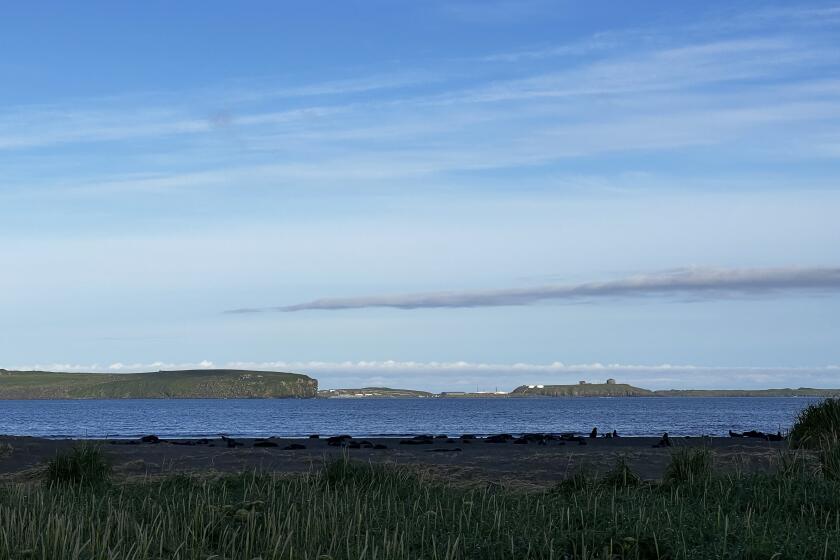Riding the Waves
The determined captain stands erect, looking straight beyond the pitching plank of his 10-ton fishing boat. From under gray hair, Jerry Cicconi’s eyes fix on the vast, heartless sea.
His mad purpose is to harpoon big fish.
Earlier in the day, he had talked about the feeling of closing in for the kill, of aiming the 12-foot tool and thrusting the deadly dart into the creature’s flesh. He had spoken passionately of the pressure to get the job done in one shot, the necessity of a surgical strike, the adrenaline rush, the racing heart, the trembling knees.
“Nothing in the world compares,” he had said.
Now he speaks, not of the thrill of landing a 500-pound swordfish, but of other, less elusive monsters who fish the oceans off the coast of California like evil ghosts. “They’ve killed all the fish,” he thunders. “The ocean has become a desert without snakes.”
His concentration returns to the unrelentingly choppy waters off Dana Point. There is only one other boat within view. Not a good sign.
“Boats are like white flies, they are so scarce,” he grumbles. “Nobody’s out here anymore. Trying to find a fish is like trying to find a needle in a haystack. This stinks!”
As harpooning swordfish becomes more difficult and less economically feasible, Cicconi and other local harpooners have become an endangered species. For the past 33 years, Cicconi has operated one of the most consistently successful harpoon boats out of Avalon. Three decades ago, before a series of events altered the nature of local fishing, he and his fiercely independent colleagues could bring in 250 swordfish during the summer and fall swordfish season. Today, they consider themselves lucky if they harpoon 75.
To harpoon a swordfish, a Xiphias gladius, which likes to nap and sunbathe on the surface of the water, fishermen now commonly employ pilots to help spot fish. By Cicconi’s own definition, harpoon fishing has become more “M*A*S*H” than Melville, an occasionally wacky war that unfolds, not in the water, but in the air. “With fewer fish, the competition is unbelievable,” Cicconi says.
Since the late ‘70s, when hundreds of boats brought in large catches worth thousands of dollars, Cicconi guesses there are only about a dozen serious harpoon fishermen in California left--if that. It is a figure Norm Bartoo, a marine scientist at the federal Southwest Fisheries Science Center in La Jolla, doesn’t dispute.
At 65, Cicconi says the agonies of harpooning fish are beginning to far exceed the ecstasies. He thinks about packing it in.
Then a smile travels over his playful, sun-scorched face.
Call him Ishmael. Call him nuts. But don’t count him out.
*
It’s lunch time aboard the Felucca, but Cicconi isn’t eating. When you fish, you fish. After the engine is turned off, then you eat, “then you drinka the vino.” Now it’s time to “usa the eyeballs.”
Cicconi, a solidly built man with powerful hands, knows his thick accent is charming. He enjoys it as much as anyone and isn’t afraid to laugh at his own jokes. He is an unequivocally charismatic man who exudes a lively Mediterranean magnetism.
With exuberance and affection, he talks about his beloved Mama who lives in the Italian port town of San Benedetto del Tronto on the Adriatic coast, where he and his brother and sister were raised, and of his grandfather, a master blacksmith, who taught him how to work with his hands after his father died when he was 3.
He is a tawny fisherman who skis in Europe and publicly defends harpooners in any forum he can, a craftsman who can transform planks of wood and sheets of steel into houses and boats, an independent artisan of the sea who meets his prey one-on-one and looks more like a yachtsman than a guy who’s gutted as many fish as anyone.
From the crow’s nest of the Felucca 23 feet above the water, he surveys the sea and the sky with his naked eyes, then peers up to the heavens through a pair of binoculars.
Conditions couldn’t be worse. The water continues to be choppy, the sky cloudy.
But it is another force that sears his soul, a force that is never far from his mind, a force that transforms him into a raging wild man.
“The drift net fishermen are the cancer of the ocean,” he roars. “They are evil. They are greedy. It will take years--if ever--to repair the damage they have done. Look. There are no boats. There’s nothing to catch anymore. They are criminals, thieves!”
To understand the plight of swordfish harpoon fishermen, one must go back to the late ‘70s, when drift nets were first commonly used in local waters. Though Cicconi and other veteran harpooners are quick to blame the net fishermen for their woes, Chuck Janisse, executive director of the Federation of Independent Seafood Harvesters, says the problems the small independent harpooners face can’t be blamed on any one thing.
“Fishermen are always bickering,” Janisse says. “It’s easy to blame everything on the gill net fishermen. One [fishing] gear type bad-mouths the other gear type. Fishing is going the way of the family farm. It’s harder and harder for everybody to make a living.”
David Black, one of Avalon’s most successful harpoon fishermen, says ever since the drift nets came in, it’s not only been harder and harder to make a living, but everything has become much more complex. “Now you’ve got to have a good boat, a good plane, a good harpooner, a good driver and a good pilot who shows up on time,” he says. “It’s tough.”
Cicconi and Black, two of the most respected and outspoken harpoon fishermen around, charge the fishermen who use mile-long drift nets and 30-mile-long lines with thousands of hooks with indiscriminately killing everything that swims, and with ruining a noble fishing tradition that has spanned three millenniums.
“They have no respect for the ocean,” Cicconi says. “No respect for the future.”
Southwest Fisheries’ Bartoo is well aware of the wars between harpoon fishermen and drift net fishermen. “There are fewer fish than there used to be,” he says. “But it is a local phenomenon.”
Though California Department of Fish and Game statistics show there are still plenty of swordfish coming to market in Los Angeles from the Pacific Ocean, Bartoo says drift nets have taken a toll on the fish supply directly off the coast of Southern California.
“There are still fish,” he says. “But it is harder for the harpooner fishermen and the recreational fishermen to find them. Net fishermen can do OK with a lower fish density.”
Other factors have hit the individual harpoon fisherman, Bartoo says, including higher costs of doing business and growing competition from countries such as Chile and Taiwan.
Harpoon boats are considerably smaller and less seaworthy than large commercial net fishing vessels. They rarely range beyond 100 miles from the coast and aren’t equipped for long voyages on the high seas. Large commercial net vessels are built to withstand very rough water and can venture a thousand miles out, he says.
*
Cicconi will concede harpoon fishermen have been hit by a number of factors, including mercury scares, foreign competition and lengthy El Nin~os, which cause swordfish to migrate elsewhere. But he is adamant that the nets were the “coup de gra^ce.”
The first two years he fished, Cicconi didn’t even have a ship-to-shore radio, much less the small Cessna 150 plane he now owns to help spot fish. Today’s harpoon fishermen have very sophisticated equipment--and skyrocketing costs.
“Now we use a lot more fuel. The engine doesn’t last as long. There is more pollution. We use more of everything to catch fewer fish.”
Think of a swordfish as a $1,000 bill floating on the water. You are a pilot hired to spot it. If everyone involved in landing the grand does exactly what he or she is supposed to do, you’ll get 35% of the money if you own the plane, 20% if you don’t. The deckhand who wields the harpoon, from a perilous pulpit at the end of a protruding 37-foot plank, gets 20%.
The skipper gets the rest, if there is any left after he pays the bills. Nobody gets anything, of course, if one of the principals makes a mistake. The margin of error is very close to zero. Line the boat up to the fish wrong or make a bad “stick,” and the $1,000 bill swims away.
Not surprisingly, with fewer people spending far more money to catch far fewer fish, the pressure is on. If the harpooner misses the shot, he not only has to endure his own disappointment and self-loathing, he’s got to live with the skipper’s disappointment and the pilot’s scorn.
“They’ll radio down or fly by screaming at you,” says Robert Rapson, Cicconi’s good-natured apprentice, a joyful bear of a man of 36 who had only earned $500 at harpooning fish by the third month of the season. “It’s awful. You feel bad enough already, and then you’ve got this arrogant pilot yelling at you.”
Some pilots remove the plane door so they can better spot fish. Though Cicconi says many are top-notch fish spotters and are complete gentlemen, others are hopeless. He says his mind is blown by the sights he now witnesses on the once tranquil sea.
He recalls the day a pilot--a pilot on his payroll--flew very near the Felucca, pulled down his pants, and “mooned” him and Rapson from the open door of the cockpit.
Cicconi is still dumbfounded by the stunt. Looking back to simpler days, when fishermen didn’t even use radios and radar, let alone pilots and planes, he says all he used to need was a boat, a harpoon, a loaf of bread and a jug of wine.
The ocean used to be a place where fishermen could go to restore peace to their troubled minds. The sea was a place, as Ishmael said in “Moby Dick,” to go to find a wholesome environment and to seek out things “everlastingly remote.”
Now, the sea gives the troubled mind a headache, Cicconi says. The word “remote” has to do with controls.
*
It’s midafternoon, and Cicconi has about given up hope that weather conditions will improve or that his pilot will show up. All anyone out here ever talks about anymore is pilots and planes, he says. Pilots and planes. Pilots who don’t show up. Planes that need new tires.
“Airplanes are a pain in the neck,” he growls.
No sooner has he made the oft-repeated proclamation than a scratchy noise can be heard from the radio. It’s a pilot. Unfortunately, it’s not Cicconi’s pilot.
He and Cicconi commiserate about the weather, and then the pilot signs off with a high-spirited, “Go get ‘em!”
When Cicconi married an Italian American woman from Catalina and immigrated to California in 1956, he couldn’t have dreamed what the ancient harpooning tradition would become on his watch. He had met his bride-to-be while on a trip to the United States as a young engineer in the Italian Navy. He had come to Long Beach to learn how to man a minesweeper and didn’t speak a word of English.
His grandfather had reared him to take pride in a job well done. At the family’s machine shop, he had taught his grandsons this message: “No one’s perfect. But everything’s possible.” And he had given Cicconi what would become his mantra, Ti Devi fare le scarpe quando hai il cuoto: When you’ve got the leather, you’ve got to make the shoes.
After immigrating to Catalina, Cicconi’s first job was slinging rocks at a quarry. “I arrived in Catalina on April 11, 1956,” he says with pride. “I got my first job three days later, April 14, 1956.”
Off-hours he fished, and in 1957 was awarded a trophy for catching the biggest fish to date by a fisherman single-handedly. The blue marlin weighed 365.5 pounds. With an eye fixed on the sea, he quit the quarry job after a year and a half to work for his brother Virgil, who had followed his younger brother to Catalina and opened a construction business.
Jerry Cicconi also began building the first of three boats. He christened the 40-foot Felucca, named for the swordfish boats of Sicily, in 1969. With the exception of the engine and the electronics, he designed and built the entire sturdy trawler with his own hands--from sawing wood for the shelves in the galley to constructing the hull, painting the decks and welding the steel plank and mast.
The Cicconi brothers, who are known for their warm hearts and hot tempers, began their fishing ventures as partners but quickly realized they would have to have separate boats and separate businesses if they wanted to remain close.
“We’re tight like a chain linked together,” he says of Virgil, who now owns a mozzarella company in Carson.
Jerry Cicconi eventually began his own construction company and built several houses during the months he wasn’t fishing, including the house he lives in with his second wife, Patricia. He has three grown daughters and is the grandfather of two sets of twins.
Matt Saldan~a, principal of the Avalon schools, says he and all his friends have fond childhood memories of watching Cicconi build boats. Saldan~a remembers when Virgil got his own boat, and when Cicconi’s nephew Marco built his own boat, the Sapanetta.
Saldan~a has a boat like Cicconi’s first boat, the Felucca Baby. When asked what kind of boat it is, he says he’s not exactly sure.
“They have their own look,” Saldan~a says. “On Catalina we call them Cicconi boats.”
Looking back to the glory days of harpooning swordfish, Cicconi recalls three separate days in the ‘60s and ‘70s when he and his crew landed 12 swordfish. It took enormous energy, but it was exciting work that demanded all of his mental and physical powers. It was straightforward. If you worked hard, you made money and you felt good, Cicconi says.
“There were so many fish it was like a gold rush out there.”
Now he does what he can to help fishermen who no longer can earn a living. One of his friends lives aboard a boat in Avalon but can’t afford to maintain or run it. “That’s all he’s got,” Cicconi says. “He doesn’t know how to do anything else. He can’t afford to get his teeth fixed. He drinks like a fish.”
Rapson says the skipper is known for giving harpoon boat fishermen loans and gifts of money and food. “He’s a gem,” Rapson says. “He’s Old World.”
*
It’s early evening and Cicconi has anchored the Felucca for the night off Dana Point Harbor. There are no swordfish to unload, not even a small fish to cook for dinner. Over the din of Jet Skis, he drinks several glasses of cabernet sauvignon and talks about his life, while Rapson barbecues T-bone steaks. Most of all he tells--not fish--but airplane stories.
Airplanes and Jet Skis have become metaphors for the end of an era. Still, he says, he’s one of the lucky ones. He’s made plenty of money, and he’s not going to starve if he doesn’t catch fish.
“The worst situation in the ocean for a fisherman is not to catch fish,” he says. “If the weather gets bad and the ocean blows, you cope with it. You can use a parachute to stabilize the boat. There are all kinds of things you can do.
“But when there aren’t any fish, you are miserable. You are demoralized. You go home with your tail between your legs.”
For all the frustrations, Jerry Cicconi doesn’t look like a man who’s about to sell his boat and take up golf. No matter how bleak things can be, a fisherman knows his luck can change in an instant.
And when it does, something happens, something inexplicable. “We catch a fish, and we are healed.”
There is fire in the eyes when he points to a vein in his forearm and declares, “I fish because of something that runs deep in here.”
By last week, Cicconi said the swordfish still weren’t “popping.” “It’s like a mortuary out there,” he reported.
More to Read
Sign up for Essential California
The most important California stories and recommendations in your inbox every morning.
You may occasionally receive promotional content from the Los Angeles Times.










